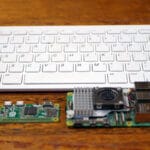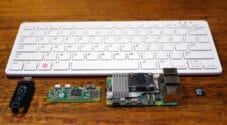Ever wondered what is a Raspberry Pi? In this article, we take a look at what this incredibly cool little computer is and also briefly what you can do with one.

We also cover all the current iterations of the Raspberry Pi currently out there and what you can expect to get out of them. Each version is slightly different, and one may better suit your needs than another.
In this guide, we cover the basics of a Raspberry Pi and operating systems. Lastly, we go through each iteration of the Pi, starting with the Raspberry Pi 5.
The Basics of a Raspberry Pi
To put it simply, a Raspberry Pi is a tiny computer about the size of a credit card. The board features a processor, RAM, and the standard hardware ports you find on most modern computers.
The features of a Raspberry Pi mean you can do most things a desktop computer can do. Tasks include document editing, playing HD video, playing games, coding, and more.
The Pi won’t have as much processing power as a desktop PC, but since it is a lot cheaper it makes for a great little computer that you can play around with. If you happen to break one, it is not going to cost you a fortune to replace it.
A Pi is also great at doing a lot of things that you don’t need an expensive computer. You can do stuff such as run as a home NAS (Network Attached Storage), web server, media center, Torrent Box, and much more.
Operating Systems
The main operating system for the Raspberry Pi is Raspberry Pi OS which based on Debian. It is a Linux distribution, so you will likely find it a little different if you’re used to a Windows computer.
Even though the main supported operating system is Raspberry Pi OS, you can install other operating systems. Some examples include Ubuntu mate, Ubuntu Core, OSMC, RISC OS, and many more.
If you’re looking for Raspberry Pi projects, head over to our main tutorial page. We have an ever-growing list of fantastic projects.
There are quite a few different models of the Pi that you will see on the market. I will discuss the features of each and why you might choose a certain model over another.
Video
You can check out my video below explaining what a Raspberry Pi is. It also goes into some topics that you should know if you’re thinking about getting one.
As there has been some time since I put together the video, there are some more recent Raspberry Pi’s missing from it.
Raspberry Pi 5

The Raspberry Pi 5 is the latest version and brings with it a wide range of upgrades.
The two largest changes between the Raspberry Pi 4 and 5 are a new processor and a new I/O chip. The new quad-core will give you a decent performance boost, while the I/O chip will provide you with more options for connecting peripherals to the board.
The Raspberry Pi 5 has a built-in Real Time Clock (RTC) chip. This chip is important if you require the time to be accurate on the device. However, it will require a separate battery to function when the Pi loses power.
It also now has a power button that allows you to turn the power on or off at the press of a button.
Below is a list of some of the main features of the Raspberry Pi 5.
- 2.4GHz quad-core 64-bit Arm Cortex-A76 CPU
- VideoCore VII GPU with support for OpenGL ES 3.1, Vulkan 1.2
- Dual 4Kp60 HDMI® display output
- 4Kp60 HEVC decoder
- Dual-band 802.11ac Wi-Fi
- Bluetooth 5.0
- Two USB 3.0 ports (5Gbps) and Two USB 2.0 ports
- Gigabit Ethernet (POE+ is supported but requires extra hardware)
- PCIe 2.0 x1 interface
- Real-Time Clock
- Power Button
We discuss this version of the Raspberry Pi in a dedicated article that I highly recommend reading if you have spare time.
Read More on the Raspberry Pi 5
Raspberry Pi Zero and Zero W

The Raspberry Pi Zero is the smallest and cheapest of all the Pi’s currently available. This board is priced at $5 USD and features the bare bones of the Pi on a super small board.
While this Pi won’t be able to handle a massive amount of processing, it is perfect for embedded projects. It is also great for anything that doesn’t require huge amounts of processing power or RAM, much like the Pi A+.
You can see below the summary of the features of the Pi Zero.
- 1Ghz, Single-core CPU
- 512MB RAM
- Mini HDMI
- Micro USB Port
- Micro USB power
- Micro SD Card Port
- HAT-compatible 40-pin header
- Composite video and reset headers
The Raspberry Pi Zero W has wireless capabilities, which makes it extremely handy on a board so small. You will be able to utilize Wi-Fi and Bluetooth using the Pi Zero W
Raspberry Pi A+

The Raspberry Pi A+ is the low-spec and cost version of the Pi. You will find that this version only has one USB port, lower power consumption, no Ethernet port, and only 256 MB of ram. The latest version has 512 MB RAM.
This version of the Pi is better suited for projects that don’t require a considerable amount of processing power and will benefit from the lighter weight and smaller size.
You can do a ton of things with this board such as robotics, remote control planes, remote control cars, and embedded projects. To name a few examples, it would make for a great robot brain, touch screen car dashboard, motion-sensing camera, and much more.
Raspberry Pi 4

The Raspberry Pi 4 had quite a few upgrades to the hardware which makes it far superior to the previous generation.
This version brings with it a 1.5GHZ quad-core ARM Cortex-A72, which is much better than its predecessor.
There are also more RAM options for this Raspberry Pi. For example, you can choose between the classic 1 GB version, 2 GB, and 4 GB.
Many more improvements make this a board super appealing for enthusiasts and casual users. The 4gb makes it a very viable desktop computer replacement.
A full list of all the new bits and pieces in the Raspberry Pi 4 is listed below.
- A 1.5GHz quad-core 64-bit ARM Cortex-A72 CPU (Roughly 3× performance)
- 1GB, 2GB, or 4GB of LPDDR4 SDRAM
- Full-throughput Gigabit Ethernet
- Dual-band 802.11ac wireless networking
- Bluetooth 5.0
- Two USB 3.0 and two USB 2.0 ports
- Dual monitor support at resolutions up to 4K
- VideoCore VI graphics, supporting OpenGL ES 3.x
- 4Kp60 hardware decode of HEVC video
- Complete compatibility with earlier Raspberry Pi products
I talk much more about the Raspberry Pi in our dedicated article, so be sure to check that out if you have the time.
Raspberry Pi 3 & 3 B+

The Raspberry Pi 3 is the third major version of the Pi and beats version 2 in performance and features. This version offers a few extras that make using a Pi so much easier.
This version of the Pi brings with it a new CPU that clocks in at 1.2Ghz and is 64 bit, however, you’re likely to be only installing a 32bit operating system onto the Pi 3.
The Pi also has onboard Wi-Fi (802.11n) and Bluetooth 4.1. These new features will enable you to do some pretty cool stuff while freeing up more of your USB ports.
The rest of the board remains pretty much the same, but the new features I mentioned above are a great addition to the Pi.
To summarize the new features, I made a list that you can see below.
- Broadcom BCM2387 chipset
- The 1.2GHz 64-bit quad-core ARM Cortex-A53 CPU
- Integrated 802.11n wireless LAN and Bluetooth 4.1
You can also get the Raspberry Pi 3 B+, which has a few slight upgrades but not as many as the new Pi 4.
If you’re interested in picking up the Pi 3, you can find it at most major retailers such as Amazon.
Raspberry Pi 2

The Raspberry Pi 2 is the second major generation of the Pi. This Pi and the version B+ is one of the most popular versions you will find around due to the processing power and amount of ports you get on with it.
The Pi 2 is the replacement of the B+ and features a 900MHz quad-core CPU and 1GB of RAM. The rest of the specs remain the same as what you will find in the previous model.
I have listed the specs below:
- 40 pin extended GPIO
- 4x USB 2.0 ports
- Stereo out and composite video port
- HDMI Port
- CSI (Camera Interface Interface) and DSI (Display Serial Interface) ports
- Micro SD card slot
- Micro USB power source
This version of the Pi has now been replaced by the more powerful Raspberry Pi 3, 4, and 5.
Raspberry Pi B+ & Model B

Raspberry Pi B+ and B are old versions of the Pi that has now been replaced by the Pi 2.
The B+ version features a single-core CPU, 4 USB ports, microSD card slot, and lower power consumption.
This model improves on the previous model B that only had two USB ports, higher power consumption, full-sized SD Card slot, and a few other things.
You can still find the B+ model on for sale, but it will be slowly replaced by the newer and better versions of the Pi.
Conclusion
If you own a Pi and haven’t installed the operating system, be sure to check our helpful guide on installing the Raspberry Pi OS.
I hope this article has helped you understand what a Raspberry Pi is and what you can do with one.
Feel free to drop us a comment below if you have a question, feedback, I have missed something, or anything else related to this article.










very useful and in-depth review on several version of the remarkable pi ! Offered considerate and elaborate details ,the users will save more time and money to buy the very pi they need .It is cool!